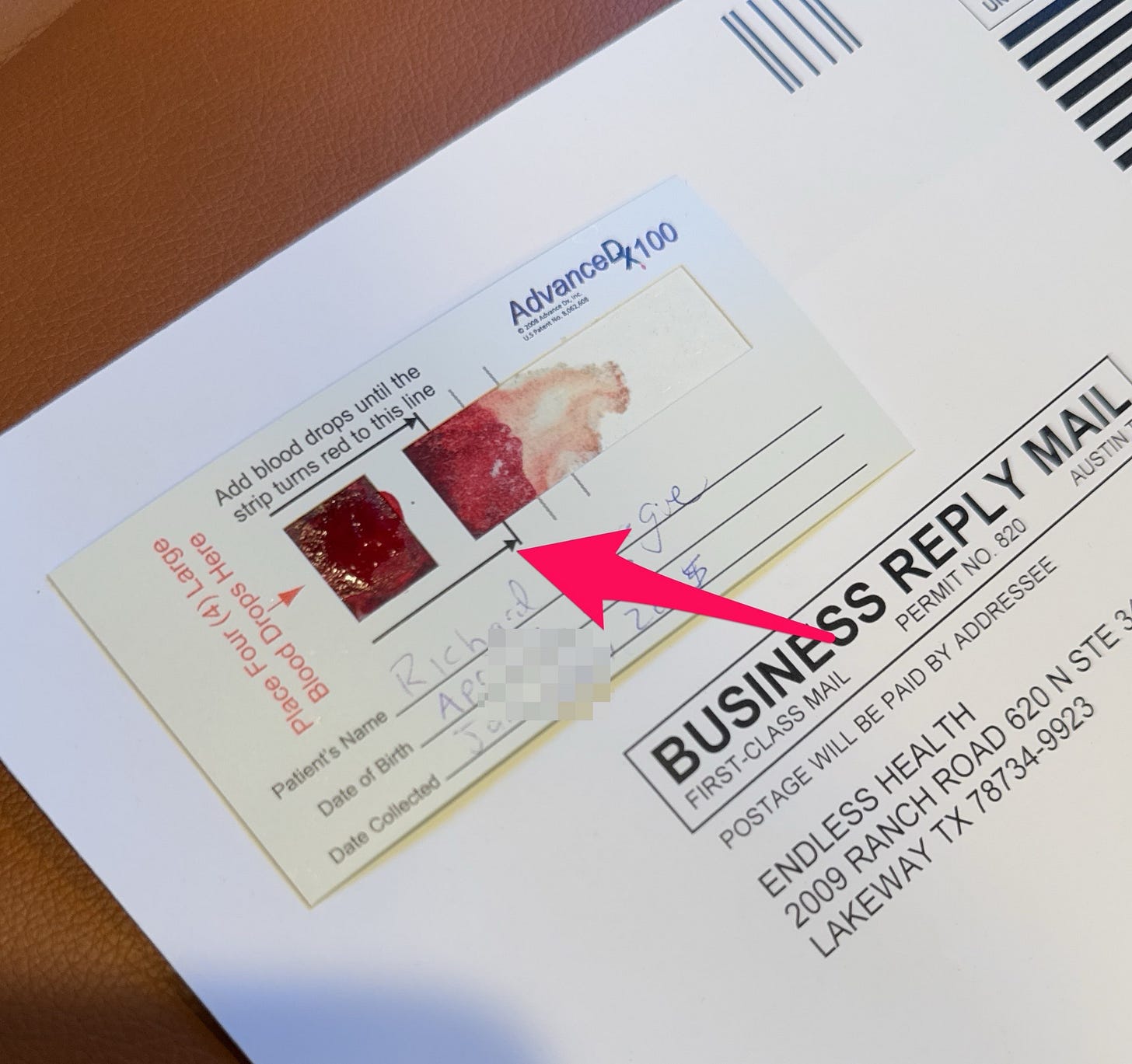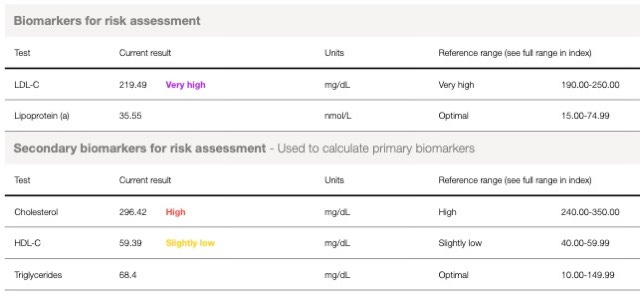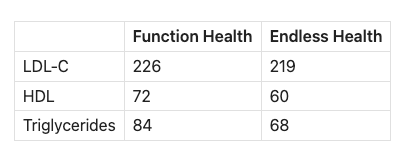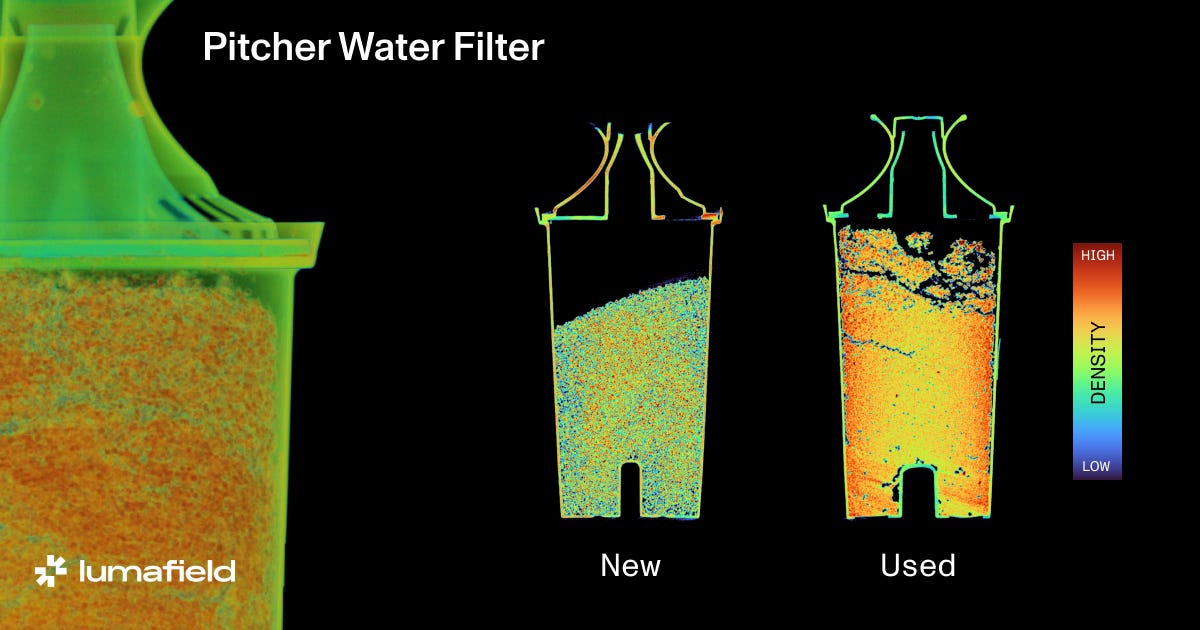A family emergency has me thinking more about how to evaluate risk of cardiac disease.
I tested a new (free) cholesterol test to see if it could reveal more about my own risks.
My 84-year-old mother has been complaining for months about swollen legs. Her feet have grown more painful over the decades, aggravated by a botched foot operation long ago, so the family assumed this was just some unfortunate age-related decline. When the swelling became unbearable enough to see a doctor, we learned the truth: congestive heart failure, caused by 90% blockage of the arteries leading to the heart. The severely-limited pumping ability meant that liquids were accumulating in her legs and feet. Fortunately we caught it in time, she underwent a stent operation, and now she’s fine.
Since my mother and I share lifelong high blood cholesterol levels, this was a warning to me to double-check that I’m doing everything possible to prevent my own heart from a similar blockage. Most personal scientists know about the standard cholesterol tests - LDL, HDL, triglycerides, but the skeptic should wonder if that’s the whole story. Did you know that 75% of first-time heart attack patients have normal cholesterol levels?
Testing My Lp(a)
There’s another blood marker that's been gaining attention: Lipoprotein(a), or Lp(a). It's essentially an LDL particle with an extra protein attached, making it potentially more dangerous for heart health. I recently decided to test mine using one of the new at-home blood collection cards from Endless Health. (Order your own free test here)
Like many of my self-experiments with blood collection cards, this one was messier than expected. After two finger pricks with the included lancets, I still couldn't generate enough blood to reach the minimum line on the diffusion paper. It took two additional pricks and a lot of finger-squeezing before I finally had a usable sample. While these at-home collection methods are convenient, they're not always as straightforward as the marketing suggests.
I timed my test to be the same morning as my semi-annual Function Health blood draw, taken with a Quest Labs phlebotomist. (See PSWeek 240912). This lets me compare the at-home test with the more traditional — and presumably rigorous—one at a local lab.
As you can see, while most of my cholesterol values are terrible, My Lp(a) result came back at 35.55 nmol/L, which Endless Health categorizes as "Optimal." This compares similarly to my Function Health Lp(a) measured six months ago at 40 nmol/L.
This was reassuring, especially since Lp(a) levels are largely determined by genetics and don't respond much to diet or lifestyle changes.
Unfortunately there were significant differences between the other Endless Health lipid values and the ones reported by Function Health, despite both tests taking place within an hour of each other, fasted on the same morning.
That said, although the results seem notably different, both companies think I’m close to the healthy ranges for HDL and Triglycerides.
In other words, my LDL-C is through the roof awful but the other lipid biomarkers are fine. We already discussed one other easy at-home cardiac test back in PSWeek 240905 that showed my arteries seem fine. Does that mean I’m likely to avoid the fate of my mother?
Personal science is never settled, so I’ll continue to look into other measures of heart health in future issues.
Some Lp(a) References
The latest podcast discussion between Peter Attia and Tom Dayspring on lipids is highly recommended (YouTube). A few notable facts: About 50% of heart attacks (in males) happen before age 65. Roughly 40% of people die at their first heart attack.
See a full transcript here: Peter Attia and Tom Dayspring.
Some people with identifiable arteriosclerosis have high Lp(a) despite no other obvious risk factors.
They recommend Lipid.Org as the best overall resource, including details about Lp(a):
Carriers of rs10455872 or rs3798220 tend to have higher Lp(a) concentrations and higher risk for cardiovascular disease.
Your Lp(a) pretty constant throughout life.
On Twitter/X, @Lpa_Doc Sam Tsimikas MD warns Lp(a) results using different units are not comparable. Don’t rely on conversion formulas. Instead check if in mg/dL, nmol/L or Lp(a) cholesterol. The normal levels are <30 mg/dL, <75 nmo/L and <10 mg/dL, respectively. Note that both Function Health and Endless Health track in nmol/L. My results, roughly 40 nmol/L are considered well within optimal range.
Personal Science Weekly Readings
Back in PSWeek 230605, I showed my results from a CGM-based trial test from Tastermonial using the glucose-lowering powder from GlucoTrojan. They recently published their pre-print giving more details of their protocol.
We’ve been skeptical of Bryan Johnson’s longevity efforts since the beginning, and now Spencer Klavan offers some more philosophical reasons: Don’t Not Die argues that an obsession with living forever comes at the expense of, well, living now.
Lumafield does industrial grade CT scans of common objects. Home water filters become clogged over time, letting some water flow unfiltered:
Pitcher filters are household staples, using a blend of activated carbon and ion-exchange resin to trap impurities such as chlorine, sediment, and heavy metals like lead. When water passes through, the carbon absorbs contaminants, while the resin removes specific ions to improve taste and safety.
A CT scan of a new pitcher filter reveals a porous, uniform core of activated carbon and resin. The material’s consistency ensures even water filtration throughout the cartridge. After use, however, the scan tells a different story. Clearly-defined flow channels are visible, suggesting that water is following the same path through the filter media each time, limiting the thoroughness of filtration. The once-pristine pores are partially blocked by accumulated sediment and impurities, and denser particles have migrated to the outer edges of the core—indicators that consistent, uniform filtration is a thing of the past for this particular filter.
via (X)
About Personal Science
Everyone likes science, right? Even the most outrageous fraudsters wrap their deceptions in a veneer of science. So if everyone claims to be on the side of science, how do you know which science to believe?
Personal scientists think science is not something you believe, it’s something you do. We’re open-minded enough to listen to just about anyone, but we’re also skeptical—of everyone, including those with credentials and titles.
If you want to learn about new, cool ideas about the world of personal health or performance, there are better sites than this one. But if you just want to practice science for yourself, for personal reasons, please join us at Personal Science. Meanwhile, if you have additional ideas you’d like to discuss, let us know.









Glad to hear your mother is fine. My mother-in-law had a similar issue that doctors ignored for years despite her complaints (gender bias in action?), and that was fixed with a stent before it was too late.
My primary care office has a device that checks HDL/LDL from a finger-prick sample; the results it produces are all over...
Since you are doing all the tests: apoB?